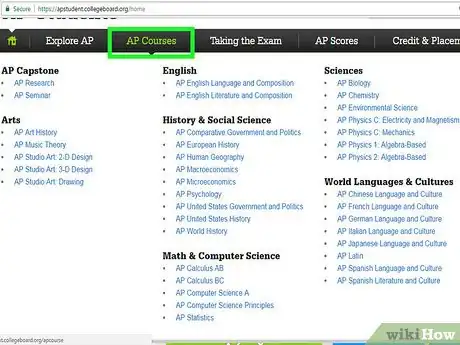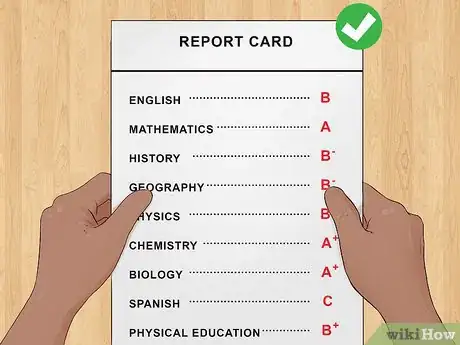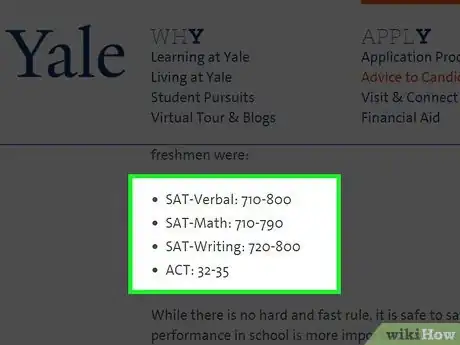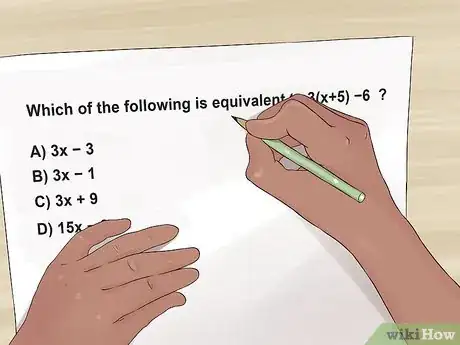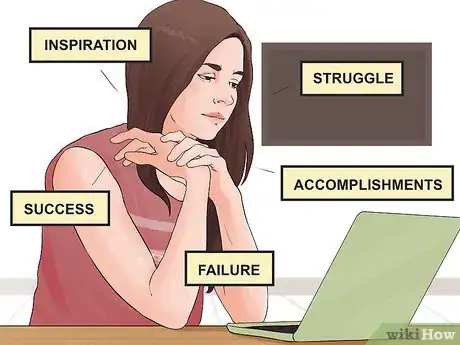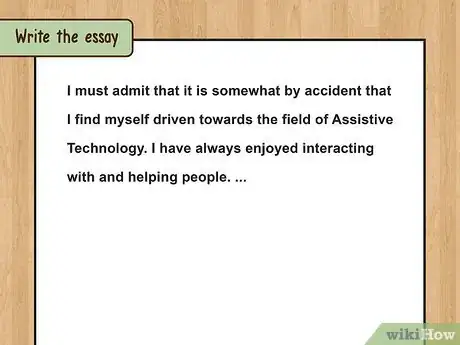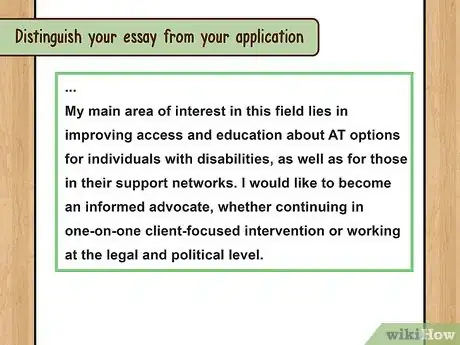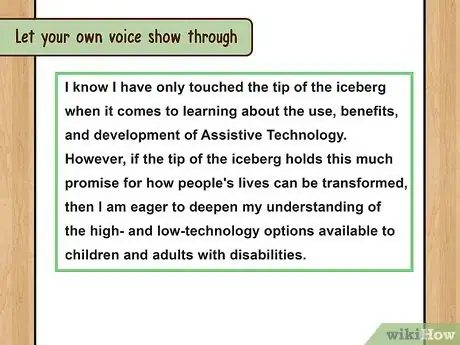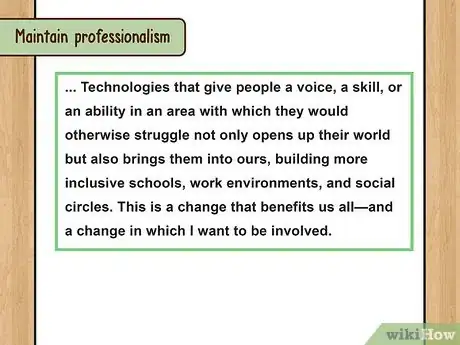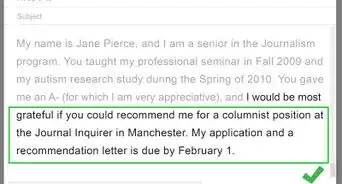This article was co-authored by Alexander Ruiz, M.Ed.. Alexander Ruiz is an Educational Consultant and the Educational Director of Link Educational Institute, a tutoring business based in Claremont, California that provides customizable educational plans, subject and test prep tutoring, and college application consulting. With over a decade and a half of experience in the education industry, Alexander coaches students to increase their self-awareness and emotional intelligence while achieving skills and the goal of achieving skills and higher education. He holds a BA in Psychology from Florida International University and an MA in Education from Georgia Southern University.
There are 13 references cited in this article, which can be found at the bottom of the page.
This article has been viewed 22,855 times.
Getting into a top college takes planning and lots of hard work! Start working hard to make good grades and scoring high on tests as soon as possible. Join extracurricular activities and seek out ways to show that you're a leader who is committed to bettering your community. Finally, stand out from the crowd with a stellar admissions essay.
Steps
Getting Good Grades in Hard Classes
-
1Start immediately. Most top colleges look at your transcripts for all of the years you were in high school. Though there are a few that hold open spots for high school students whose academic records improve over time, most will be taking your entire high school career into account. It’s nearly impossible to get into a top college if you tank your GPA in the beginning.[1]
- Don’t completely write off your chances if you struggled during the first few years of high school. Try to make up the ground in summer school or by taking more core classes (like 2 foreign languages or 2 sciences) during your last few years of high school instead of taking electives.
-
2Talk to your guidance counselor about a four-year plan. If you’re planning to take calculus as a senior, but you don’t have all of the prerequisites by that time, you won’t be able to take it. Let them know that your goal is to get into a top college so that they can help you figure out which classes to take from the very beginning of your high school career.[2]Advertisement
-
3Take hard classes. It’s usually not enough to get straight As in standard classes. If your school offers honors, AP, IB, or dual-enrollment classes, you should take as many as you can reasonably handle.[3]
- Talk to your parents, teachers, and guidance counselor about how many advanced classes is reasonable for you. You obviously don’t want to take so many that you overwhelm yourself and do poorly in your classes.
- The number of advanced classes you take will probably also be related to the number of extracurricular activities you take part in. Remember that colleges are usually interested in well-rounded students who can demonstrate proficiency in a variety of activities. Make time in your schedule for more than school.
-
4Take AP tests if you’re enrolled in AP classes. Though the classes themselves look good on your transcript, they key is scoring well on the tests. Start saving early if your parents aren’t going to be able to cover the cost of your exams. Each one costs $92.[4]
- Though $92 seems pricey, remember that most top colleges offer college credit for high scores on the AP test. Check out the AP Test Credit Policy search website to find out if the schools you’re considering accept AP credit.[5]
- There’s a chance you can get a fee reduction if you have significant financial need. Talk to the AP Coordinator at your school. (This is probably your guidance counselor, but if it isn’t, they’ll know who you should talk to.)
-
5Keep that GPA up. Most top colleges want as close to a 4.0 as possible (on an unweighted scale). Get in the habit of studying from the very beginning of high school. Stay after school whenever possible to talk to your teachers if you’re struggling - even if it’s only a little bit. Be proactive about getting As.[6]
-
6Finish strong. “Coasting” through your last two years looks terrible on your transcript. Just like you need to start getting good grades in hard classes your freshman year, you also need show that you haven’t slacked off by the end of high school.[7]
Scoring High on Standardized Tests
-
1Figure out what standardized tests scores the schools you’re interested in want to see.[8] Every school in the U.S., including the Ivy Leagues, will accept either the SAT or the ACT as of 2007. Though most people submit SATs to top colleges instead of ACTs, admissions experts say that there is no compelling evidence that schools favor one test over the other.[9]
- Most top colleges have a minimum test score that they deem acceptable for admittees (plural form of admittee), so check out what that score is. This information will be on the website of the school you’re interested in.
-
2Take practice tests. Get an SAT or ACT prep book. There are probably lots available at your local or high school library, but you can also check used book stores. (These big books are pricey if you buy them new!) You can also find digital versions of some. Again, talk to your guidance counselor, because they may have some on hand.[10]
- Be sure that the books were published within the last couple of years. The SAT and ACT undergo changes pretty regularly.
-
3Take the tests early and often. Start saving your pocket money! It costs $52.50 to take the SAT and $29 (plus $14 for an optional writing test) to take the ACT. Students almost always improve when they retake these standardized tests.[11]
- You can take the ACT up to 12 times and the SAT as many times as you want. (But remember that it’s only offered 7 times a year, and you can start taking the SAT during the fall of your junior year.)[12]
- Take the tests as soon as they are offered so that you will know whether you need to take them again or not.
- Most schools allow you to send in your best scores, but a few require that you send them all.
- Experts recommend that you not take the SAT more than 6 times if you’re submitting your scores to a school that requires that you send in the results of every test.[13]
-
4Enroll in a class or get a tutor. If you’re not scoring as high as you need to to get into the top college of your choice, see if your school offers a test prep class, and if they don’t, ask your guidance counselor about where to find an SAT or ACT class. There are dozens of online classes, and you can hire local college students to help you, but your guidance counselor will be most equipped to tell you which are the best value.[14]
Rounding Out Your Resume
-
1Learn what colleges’ goals are. Schools want to admit students who will first contribute a lot to their college community and then go on to achieve big things in the wider world. It’s hard to tell which teenage applicant will go on to win a Nobel Prize, so colleges use the application process to try to predict who has the most potential. One way that they do so is by looking at what you contributed to activities beyond academics.[15]
-
2Know the difference in well-rounded and overcommitted. A well-rounded student gets good grades but also joins a few extracurricular activities. That doesn’t mean you should join every single club or activity your school offers, because you will never have enough time to commit to every single one. Instead, pick a few that you really enjoy and work hard in those few.
- Winning awards and earning leadership positions is another great way to round out your application, and you won’t have time to put effort into that if you overcommit.
-
3Pick a team and try to stick to it. In order to demonstrate that you are dedicated, try to stick with the sport of your choice for a few years at least. Even if you’re not the star athlete, playing on the tennis team or the basketball team still shows that you’re a team player. Don’t overlook dance or cheerleading teams if throwing a ball around isn’t your thing. [16]
-
4Volunteer. Work at a homeless shelter, go on a mission trip with your church, spend a few Saturdays with Habitat for humanities, sort clothes at a donation center, join the Scouts, coach a youth sports team, walk dogs at your local shelter, collect cans for a food drive, participate in a bake sale, or read to kids at your local library. Top colleges want students who will foster change in their schools and communities.[17]
- Try to the initiative to raise money or collect donations for a cause. Being able to say, “I organized a book drive and collected over 2000 books for under-resourced schools” or “I started a walk-a-thon and raised over $5000 for cancer research” is a very tangible, concrete piece of data to put on an application. It shows initiative and demonstrates that you care about your community.
-
5Join an after school activity. Look beyond athletics. Join the drama club, the choir, or the debate team. Pick your favorite subject and join a club devoted to pursuing that subject further. Find a chess club, a gay-straight alliance, or a Future Farmers of America group. Enter academic competitions or join academic teams like Mathletes or Odyssey of the Mind.[18]
- Better yet, start a club of your own. This shows a great deal of leadership potential and the ability to organize others. It also shows that you can work well with adults, because you will probably have to coordinate with a faculty sponsor and the principal.[19]
-
6Get a part-time job. Studies have shown that students with part-time jobs have higher GPAs on average because they are forced to manage their time more carefully. Plus, real-world experiences look great on your application. Holding down a part-time job while still getting good grades is evidence that you know how to balance your time.[20]
-
7Take on leadership roles. Run for student council or just take on leadership positions in the organizations you’re already part of. Top colleges are interested in shaping future leaders, and they care about your interest and ability to organize others.[21]
Writing a Great Essay
-
1Start your essay the summer before senior year if possible. Though even a stellar essay won’t get you into a top college if you’re not already qualified, it can make you stand out from the pack and be accepted if you’re already qualified. Try to start working on it (at least brainstorming) the summer before your senior year so that you’re not stuck doing it at the last minute when you’re overwhelmed with school-related activities.[22]
-
2Brainstorm. Your first idea is probably not going to be the one that you stick with. Start a brainstorming list, outline, concept map, or whatever works for you as soon as you read the prompt. Sleep on it and return to it every day for a few days until you decide what your prompt will be. Consider:
- What people, dilemmas, animals, books, places, trips, or experiences have had an impact on your life? Can you think of a time when someone or something challenged your thinking? A time when you struggled? A time when you triumphed? It’s okay if you pick a topic that seems quite basic -- as long as you care about it and can write passionately about it.[23]
- What are your major accomplishments? What events led up to these accomplishments, and what makes you feel proud about them? (Think beyond school-related accomplishments. Surviving your parents’ divorce or the death of your dog might be an accomplishment that you’re proud of in hindsight, so if you can write about why that was important to you, go for it.)
- When you think of the topic, be sure that you also brainstorm about its effect on your life. For example, anyone can write about working for Habitat for Humanity. What will be interesting and compelling is the story of what working for Habitat meant to you or how it changed your views on the world.
-
3Write the essay. Focus on the prompt. You must respond to the question you’re given, so even if your brainstorming led to some great ideas, make sure the one you choose is appropriate for the question. Chances are good that you will be writing quite of few of these essays. Don’t reuse another old essay unless the prompt is almost exactly the same.[24]
- Spend the most time on your introduction. If it’s not compelling, admissions officers will not move past it. Try to create a bit of intrigue in this paragraph. Make your readers want to find out what comes next.
- Be sure that all of your body paragraphs relate back to the intro and fulfil its promises by giving more information about the topic you introduced there.
- Remember that the conclusion is your last chance to impress. Avoid phrases like “in conclusion” or “in summary.” Your essay is probably fewer than 500 words, so you don’t have time to summarize. Instead, link back to your intro paragraph by reiterating a word or phrase used there. Alternatively, briefly discuss the implications of your topic in a larger context.[25]
- Distinguish yourself from others. This is the number one piece of advice from college admissions officers, and it may be the hardest for high school seniors to accomplish.[26] The key is to show and not tell. For example, don’t simply write that you are a kind and caring person, show the reader that you are kind and caring by telling a story of a time that you exemplified those traits.[27]
-
4Distinguish your essay from your application. Don’t write about how much you love softball if almost all of your application is about your four years on the team, your time as captain, and your all-district medals. Don’t mention your GPA or standardized test scores.[28]
-
5Let your own voice show through. Yes, you should have an adult edit the essay for you, but don’t let them change the language so dramatically that it no longer sounds like you. This is absolutely not the time to dig out the thesaurus. It will be very clear to admissions staff if you are using words and phrases that you don’t quite understand.[29]
- Don't feel like you have to write your essay using the standard five-paragraph format. Tell your story in the natural way that will be most compelling to schools and feels truest to you.[30]
-
6Maintain professionalism. Don’t fall into the trap of trying so hard to stand out that you use lots of slang or colloquialisms. Don’t do anything gimmicky like writing the whole essay as a sonnet. It’s okay to share your opinions, but avoid anything super controversial. More than one person will read your essay, and there is no way of knowing who that person will be, so you must appeal to a wide audience.[31]
-
7Proofread and edit a dozen times. Yes, a dozen. Have your parents, your grandparents, your teachers, your friends, your counselors - anyone who is willing - read it and check for errors. You will immediately lose credibility if you have typos, spelling errors, or grammatical mishaps. [32]
Expert Q&A
-
QuestionHow can I impress a university?
 Alexander Ruiz, M.Ed.Alexander Ruiz is an Educational Consultant and the Educational Director of Link Educational Institute, a tutoring business based in Claremont, California that provides customizable educational plans, subject and test prep tutoring, and college application consulting. With over a decade and a half of experience in the education industry, Alexander coaches students to increase their self-awareness and emotional intelligence while achieving skills and the goal of achieving skills and higher education. He holds a BA in Psychology from Florida International University and an MA in Education from Georgia Southern University.
Alexander Ruiz, M.Ed.Alexander Ruiz is an Educational Consultant and the Educational Director of Link Educational Institute, a tutoring business based in Claremont, California that provides customizable educational plans, subject and test prep tutoring, and college application consulting. With over a decade and a half of experience in the education industry, Alexander coaches students to increase their self-awareness and emotional intelligence while achieving skills and the goal of achieving skills and higher education. He holds a BA in Psychology from Florida International University and an MA in Education from Georgia Southern University.
Educational Consultant Think about the experiences and projects you'd put on a resume or brag sheet. When did they start and finish? What did you accomplish? What were your tasks and responsibilities? What were some of the successes? Failures?
Think about the experiences and projects you'd put on a resume or brag sheet. When did they start and finish? What did you accomplish? What were your tasks and responsibilities? What were some of the successes? Failures? -
QuestionHow do I start applying for university?
 Alexander Ruiz, M.Ed.Alexander Ruiz is an Educational Consultant and the Educational Director of Link Educational Institute, a tutoring business based in Claremont, California that provides customizable educational plans, subject and test prep tutoring, and college application consulting. With over a decade and a half of experience in the education industry, Alexander coaches students to increase their self-awareness and emotional intelligence while achieving skills and the goal of achieving skills and higher education. He holds a BA in Psychology from Florida International University and an MA in Education from Georgia Southern University.
Alexander Ruiz, M.Ed.Alexander Ruiz is an Educational Consultant and the Educational Director of Link Educational Institute, a tutoring business based in Claremont, California that provides customizable educational plans, subject and test prep tutoring, and college application consulting. With over a decade and a half of experience in the education industry, Alexander coaches students to increase their self-awareness and emotional intelligence while achieving skills and the goal of achieving skills and higher education. He holds a BA in Psychology from Florida International University and an MA in Education from Georgia Southern University.
Educational Consultant Talk to somebody who has experience in the admissions world. There are a lot of nuances that happen within departments that aren't widely known unless you've worked in them.
Talk to somebody who has experience in the admissions world. There are a lot of nuances that happen within departments that aren't widely known unless you've worked in them.
References
- ↑ http://www.usnews.com/education/best-colleges/articles/2012/09/25/focus-on-7-strategies-to-get-into-college
- ↑ http://www.usnews.com/education/best-colleges/articles/2012/09/25/focus-on-7-strategies-to-get-into-college
- ↑ http://www.usnews.com/education/best-colleges/articles/2012/09/25/focus-on-7-strategies-to-get-into-college
- ↑ https://apstudent.collegeboard.org/takingtheexam/exam-fees
- ↑ https://apstudent.collegeboard.org/creditandplacement/search-credit-policies
- ↑ http://yescollege.com/guides/get-into-your-dream-school/
- ↑ http://www.usnews.com/education/best-colleges/articles/2012/09/25/focus-on-7-strategies-to-get-into-college
- ↑ http://yescollege.com/guides/get-into-your-dream-school/
- ↑ http://blog.prepscholar.com/what-do-ivy-league-schools-think-of-the-act
- ↑ http://yescollege.com/guides/get-into-your-dream-school/
- ↑ http://blog.prepscholar.com/how-many-times-should-you-take-the-sat
- ↑ http://yescollege.com/guides/get-into-your-dream-school/
- ↑ http://blog.prepscholar.com/how-many-times-should-you-take-the-sat
- ↑ http://yescollege.com/guides/get-into-your-dream-school/
- ↑ http://blog.prepscholar.com/how-to-get-into-harvard-and-the-ivy-league-by-a-harvard-alum
- ↑ http://yescollege.com/guides/get-into-your-dream-school/
- ↑ http://yescollege.com/guides/get-into-your-dream-school/
- ↑ http://yescollege.com/guides/get-into-your-dream-school/
- ↑ http://yescollege.com/guides/get-into-your-dream-school/
- ↑ http://yescollege.com/guides/get-into-your-dream-school/
- ↑ http://yescollege.com/guides/get-into-your-dream-school/
- ↑ http://thechoice.blogs.nytimes.com/2009/06/23/tip-sheet-essay/
- ↑ http://www.princetonreview.com/college-advice/college-essay
- ↑ http://www.princetonreview.com/college-advice/college-essay
- ↑ http://writingcenter.fas.harvard.edu/pages/ending-essay-conclusions
- ↑ http://yescollege.com/guides/get-into-your-dream-school/
- ↑ http://thechoice.blogs.nytimes.com/2009/06/23/tip-sheet-essay/?_r=0
- ↑ http://thechoice.blogs.nytimes.com/2009/06/23/tip-sheet-essay/?_r=0
- ↑ http://www.princetonreview.com/college-advice/college-essay
- ↑ Alexander Ruiz, M.Ed.. Educational Consultant. Expert Interview. 25 June 2020.
- ↑ http://yescollege.com/guides/get-into-your-dream-school/
- ↑ http://yescollege.com/guides/get-into-your-dream-school/
- ↑ http://yescollege.com/guides/get-into-your-dream-school/
- ↑ http://yescollege.com/guides/get-into-your-dream-school/



